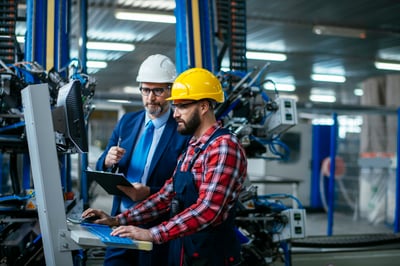June 3, 2024
 by Karthik Kumara Guru / June 3, 2024
by Karthik Kumara Guru / June 3, 2024

Imagine having a highly efficient, self-improving assistant that minimizes manual tasks and errors and allows you to focus more on strategic thinking and innovation.
Intelligent automation (IA) allows you to do just that.
IA is essentially a combination of artificial intelligence (AI), machine learning (ML), and robotic process automation (RPA) that upgrades your operational toolkit, including your payroll management. This speeds up processes and enhances them using smart, adaptive technology.
In the book Intelligent Automation, Pascal Bornet suggests that the shift to digital is inevitable. He suggests that success will be determined by how quickly and comprehensively companies embrace this transformation.
IA can reduce the costs of payroll processes by up to 80% and transform the employee experience by streamlining payroll solutions and allowing a more straightforward process with personalized salary information.
In 2022, the worldwide market for HR payroll software stood at a valuation of USD 27.65 billion. By 2030, it is projected to escalate to $61.88 billion, with an anticipated compound annual growth rate (CAGR) of 10.60% throughout the forecast period. This growth suggests that businesses are shifting toward more efficient and technology-driven payroll solutions.
To boost satisfaction and engagement within your organization, you must understand the nuances of your employee experience with payroll.
Reliance on manual, paper-based processes comes with challenges. Hours and days are spent crunching numbers and keeping records like pay stubs and pay checks manually every pay period. Errors may slip through the cracks, leading to headaches during tax season and posing a risk to your data security.
So, how do you address this challenge?
Through intelligent automation (IA).
It's like having an efficient digital workforce streaming complex tasks with precision and speed, thereby boosting productivity. You can personalize salary information, ensure timely and accurate payments, and provide employees with a self-service portal to access their payroll data anytime.
Research shows that happy employees increase productivity, which can positively affect your company's profitability. This shift towards hassle-free processes smooths out the entire payroll management journey for your employees and creates transparency and efficiency.
IA is made of a trio of groundbreaking technologies: AI, ML, and RPA. Let's unpack what each brings to your payroll process.
AI in payroll processing acts like the brain behind the operation. It makes decisions, learns from data, and even predicts future trends. It also helps understand complex data patterns to ensure accuracy in salary calculations, tax withholdings, and benefit deductions.
ML, a subset of AI, focuses on continual improvement. It uses historical data to learn and enhance decision-making over time. This means your payroll system gets smarter with each cycle, catching errors you might not even be aware of and adapting to changes in legislation on its own.
RPA automates repetitive, time-consuming tasks like data entry, payroll processing, and report generation. This means never having to input employee hours into your payroll system manually again.
Together, these components transform your payroll management, making it more efficient, accurate, and compliant.
When you use automation for your payroll problems, you're using software to figure out how much to pay everyone, taking out taxes, and making pay slips. This reduces manual data entry and minimizes errors, making the basic parts of paying employees easier. However, you still need to check on things and make updates manually.
IA in payroll is a step up.
It uses tools like AI to do more than just the basic tasks. It learns from the data, predicts future needs, and automatically adjusts to new rules or changes in your company. This means less work for you because the system can handle changes and problems on its own, making everything more accurate and efficient.
Integrating IA into your payroll system is more than just modernizing the process. It’s about transforming how your business operates and thrives. Here are seven ways IA in payroll can help your business grow.
Implementing IA in your payroll system simplifies the onboarding and offboarding of employees, making these processes faster and more accurate.
IA cuts down on paperwork and tailors the experience to each individual, boosting operational efficiency and increasing satisfaction among your team. Plus, it allows you to focus on strategic initiatives rather than getting bogged down by administrative tasks.
When you start using IA for your payroll, it ensures everyone gets paid correctly and on time. This reduces mistakes and delays that can result in employee grievances.
It keeps up with tax laws and basically does the math for you. This also enhances employee experience as they feel more secure and valued.
Self-service portals give employees direct and instant access to their payroll information, such as earnings statements, tax information, and benefits details, promoting transparency and self-reliance.
This significantly reduces the administrative burden on your HR team, as employees can manage personal information and address their own payroll queries. Such empowerment increases employee satisfaction and engagement.
Using IA that learns as it goes enables your payroll system to improve over time by learning from what it's done before and adjusting to new rules and challenges on its own.
This adaptation keeps everything in line, cuts down on mistakes, and creates a strong payroll system that can keep up with your team's needs.
Picture a payroll system that communicates instantly, alerting you and your employees about significant events the moment they happen.
Whether it's completing a payroll cycle, updates to tax codes, or personalized alerts about benefits changes, IA-integrated payroll enhances transparency and trust without waiting for batch processes or manual updates. This instant connectivity streamlines administrative tasks and creates a more dynamic, responsive payroll environment.
IA in your payroll system enhances the safety of your data and makes sure you're compliant. This tech uses top-notch security, like strong encryption and tight controls, to protect your employees' personal information from unwanted breaches.
It also keeps up with the latest laws and rules, automatically tweaking your system to align with new requirements.
Taking this proactive approach to security and maintaining compliance doesn't just keep your organization from costly penalties and reputational damage but also strengthens your employees' trust in you to look after their personal details.
Automated reports that come with smart automation can change the way you handle and interpret payroll data. This technology can analyze payroll trends, detect disparities, and effectively predict expenditure levels in salaries.
Decision-making based on real-time information is more strategic and improves one’s ability to plan for resources optimally.
Additionally, compliance efforts are simplified by automatic reporting, which also reduces the chances of mistakes. IA in payroll does not just make things easier but equips an organization with a strong analytic resource for making wiser decisions in advance.
Integrating IA into your existing payroll systems might seem daunting at first, but with a strategic approach, you can streamline the process. Here's how you can make this transition smooth for your organization.
Training your HR and payroll staff is crucial. Provide comprehensive training on the new tools and focus on how automation will change their workflow and how to troubleshoot common issues.
Continuous post-deployment support is equally important in addressing any challenges that arise.
By following these steps and best practices, you can navigate the challenges of implementing IA in your payroll system, leading to a more efficient, accurate, and compliant payroll process.
IA and other emerging technologies are reshaping the future of payroll management, promising to further enhance the efficiency, security, and user experience of payroll processes.
Here's a list of emerging technologies in payroll and how they are slated to impact the industry.
The journey to bring in fully automated, intelligent payroll systems is still ongoing. The following trends point towards a simplified yet strategically powerful payroll management.
The necessity of integrating IA into your payroll operations is undeniable. In the current dynamic business landscape, maintaining a competitive edge requires leveraging technology that redefines operational efficiency and elevates the employee experience.
A payroll framework augmented by IA is an ideal solution for supporting the modern workforce's payment needs. It enhances accuracy, effectiveness, compliance, and safety.
Apart from ensuring that the payments are made accurately, it places payroll as a strategic partner assisting business decisions. It’s a must in our modern-paced business world to adopt techniques that make operations smooth and increase satisfaction at work for the long term.
Discover the top 10 intelligent automation tools to streamline your processes and boost productivity.
Edited by Supanna Das
With nearly a decade in HR tech, Karthik Kumara Guru passionately builds products that pack a punch. Having spearheaded 100+ end-to-end implementations, he currently manages payroll strategy and product initiatives for Ramco Payce.
It’s no secret that industrial automation has been on the rise for quite some time as...
 by Heather Scurti
by Heather Scurti
Most business leaders and HR professionals understand the importance of team morale.
 by Kade Dalton
by Kade Dalton
Accounting and financial process management can be time-consuming and stressful.
 by Piyush Samaria
by Piyush Samaria
It’s no secret that industrial automation has been on the rise for quite some time as...
 by Heather Scurti
by Heather Scurti
Most business leaders and HR professionals understand the importance of team morale.
 by Kade Dalton
by Kade Dalton


